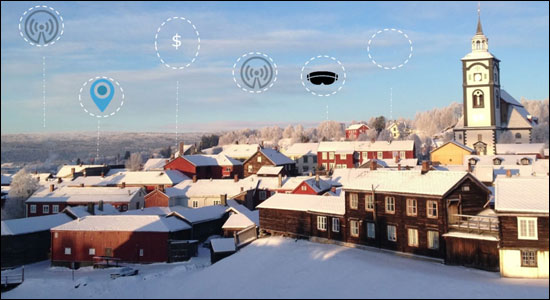
Dubai and Norway to drive visitors beyond star attractions with a blockchain-based loyalty program
By cameron in Uncategorized
Blockchain technology is running at a gallop and creating unique opportunities for travel companies to track their customer’s preferences, build more personalized and meaningful interactions, and extract more value from loyalty programs.
Case in point: A pilot demonstration of the first destination loyalty program built on blockchain.
The Dubai Points program is a project led by New York-based startup Loyyal, which has focused its efforts on using blockchain to improve the value of and potentially the security of global loyalty and rewards programs.
Along the way, Loyyal has come up with a gamified, data-protected way to encourage more tourists to visit local attractions of cultural and historic significance.
As Greg Simon, CEO and co-founder, explains to Tnooz, the startup has been actively working the Dubai Global Blockchain Council, which is run by the Dubai Future Foundation, on various blockchain applications which would be useful to airlines, hotels and tourism venues.
Last week at a conference in the United Arab Emirates, Loyyal demonstrated the blockchain-based points concept, which incentivizes travelers to try culturally-rich tourism activities.
Simon told us:
“Some cities have the problem that tourists come but they don’t go where you want them to go to get a good understanding of the uniqueness of the location. Dubai is one of those cities. They built these grand structures, like the tallest building in the world and a seven-star hotel, and people flock to that….
“Unfortunately, the rich history and culture gets missed. The concept of this project is that if you go to a place of cultural significance, like a museum or historic location you can earn points.”
Color-coded tiers of points correspond to the type of site visited and are connected to a particular family of rewards which Dubai would determine. The service will be available on a dedicated app, which shows a map of the locations, sites, activities and rewards.
When consumers download the Loyyal customized app, on Google or the Apple app store, they go through a registration process which helps form the basis of their blockchain ID for these activities.
Visitors can confirm that they have visited the sites using geolocation or with the augmented reality feature of the app which lets the user snap a picture of an object of significance and unlock those rewards points.
Points can then be used for perks like topping up SIM card balances, dining and beverages at participating partners, or arranging private car service, for example.
Next stop: Scandinavia
Loyyal has recently been named an official partner of AiSpot, a Norwegian tech company, to create a new loyalty and rewards platform in Scandinavia. Partly backed by grants from the Norwegian government, AiSpot builds applications for Scandinavian local governments, retail, and destinations in Scandinavia to boost sales and loyalty.
AiSpot will use Loyyal’s platform to create a blockchain-based rewards program, along similar lines to the prototype program in Dubai, incentivizing tourism to unique destinations and activities, while building a bridge to local businesses though the points incentives.

Per Arne Friestad, CEO of AiSpot, said of the new partnership:
“We believe blockchain has the potential to innovate the loyalty management market. We will address this loyalty module in our ready-to-go-app and platform towards both Scandinavian retail and destination….
“The Loyyal experience from Dubai Points is exciting and we believe this is will fit very well with some of the destinations AiSpot is currently working with.”
The AiSpot platform is not exclusively focused on travel. Its platform aims to collect insights about customer behavior, make marketing more efficient, and help vendors better understand their customers’ purchasing habits through activity tracking.
Miles: Lost and found
While its potential to drive tourism to underserved locations is exciting, Loyyal’s blockchain loyalty management system might also prove useful to fix the security leak in the loyalty program sector.
While miles and points programs have long been vulnerable to hackers, with members who lose points to thieves also losing confidence in the loyalty program and the travel brand, the nature of blockchain allows companies to develop more secure loyalty account management.
“You can’t get around the weak link of people having bad passwords. There’s nothing you can do about that, but one of the benefits of blockchain is the transparency of the points and the ability to see where all points are at any time,” Simon tells us.
“With the Loyyal platform there’s not an anonymous way that people that can use it. If a wallet was hacked by someone, and the miles were transferred to another wallet, we would know who owns that other wallet.
“You can’t transfer to someone unknown. Within the entire environment there’s no place to hide. You can break into a wallet, but we’re going to see where you sent it.”

Of course, there’s nothing criminals like better than a challenge. But Simon explains that program coordinators are in full control of the level of account security they want to implement–making it difficult on perpetrators to create ghost identities in order to trick the system.
“The airline can set any level of certainty that they want. If it’s a low-level, people could possibly create an alias, but if it’s a high-level, they couldn’t….
“Our platform is like a global internet of loyalty which the operator can control with a touch, but it’s also an intranet for loyalty partners. So if a vendor wants a stricter than standard level of protection they can tell others they can’t join the program until they reach that standard.”
Loyyal also puts loyalty program operators in control of transactions, making it easier to recover the value of any accounts which are compromised.
Another more sophisticated solution is the use of smart contracts to ensure that rewards aren’t stolen, says Simon.
“The points or rewards become objects which can be controlled in a remote fashion. So, let’s assume that I have 10 million miles in my mileage account and it’s a program on Loyyal. Let’s say somebody manages to get my password, and they’re moving it around from wallet to wallet just to be annoying.
“The issuer of those miles would be able to freeze it, or self-destruct it, or command it to come home. That could be done immediately. So even if the points are taken you know where they are, and you can tell them to come home.”
Kind of sci-fi
Simon also tells us that travel has only begun to tap into the potential of blockchain to personalize and innovate loyalty programs, and he expects that, in very short order, there will be more programs exploring Blockchain’s ability to correlate the activities of an individual to activities in the individual’s circle of influence.
“One of the most immediate benefits of our platform is allowing for these programs to be interoperable, to scale, and develop a customized relationship to each consumer, according to their lifestyle. What you may be offered to redeem points will be different from me, because we value different things….
“Right now, that level of loyalty rewards customization is only for high net-worth customers. But blockchain would allow everyone to have a personal concierge, so to speak…. It’s kind of sci-fi, but it’s going to happen much faster than I thought.”
Blockchain technology has payments promise for travel companies
Poor models are killing the travel loyalty star, says Booz Allen Hamilton
Airbnb acquires a team of blockchain techies
NB: Image by Patryk Kosmider/BigStockPhoto
![]()

